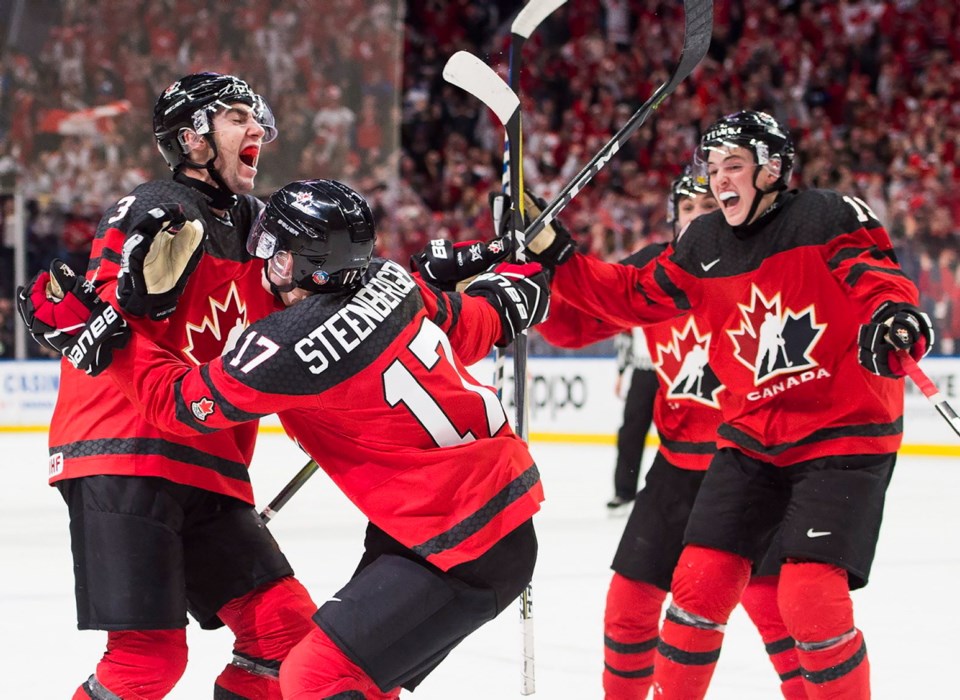The only colour that stood out more than sa���ʴ�ý’s gold at the 2018 world junior hockey championship was the blue of the empty seats that plagued much of the tournament in Buffalo, New York.
That won’t happen for the next tournament, the organizers have vowed of the 2019 championship in Victoria and Vancouver, which will open on Dec. 26.
Organizers say the 7,006-seat Save-on-Foods Memorial Centre and 18,910-seat Rogers Arena are both already three-quarters sold out.
“That is a testament to our hockey fans,” said Barry Petrachenko of Victoria, CEO of sa���ʴ�ý Hockey, and co-chairman of the 2019 tournament with Ron Toigo of Vancouver.
“Victoria and Vancouver are both event cities,” said Petrachenko, alluding to events such as the 1994 Commonwealth Games and 2010 Winter Olympics.
Attendance in Buffalo was a disaster, except for the outdoor game between sa���ʴ�ý and the U.S. and the final between sa���ʴ�ý and Sweden.
“I felt for Buffalo and the empty seats. But that will not be the case for next year,” said Petrachenko, who was in Buffalo for part of the 2018 world junior tournament.
“The plan we have in place is completely different. The experience in the buildings, and surrounding them, will be much different. Victoria and Vancouver will go much further with this tournament than where Buffalo took it.”
The International Ice Hockey Federation blamed event fatigue for the poor attendance in Buffalo, and also for many parts of the 2017 tournament in Montreal and Toronto. The 2015 world juniors were also held in Montreal and Toronto. That meant the southern Ontario horseshoe between Toronto and Buffalo, New York, was over-saturated, with the tournament being held in the region three of the past four years.
“We really expected a different result,” IIHF president René Fasel told the Canadian Press.
“Sometimes, you can overdo the saturation and where it is being played. We have to learn. You get experience only when you make mistakes. So this is one experience.”
Another problem is that few other team sports feature a world under-20 championship every year. It’s a bit much when you consider the FIFA U-20 World Cup is held only every other year. Also, the hockey world juniors are little known and lightly followed outside sa���ʴ�ý, even in other hockey-playing nations.
Hockey sa���ʴ�ý CEO Tom Renney was in Victoria last month and addressed the poor attendance in the 2017 world juniors, especially in Montreal, which was attributed to the high ticket prices.
“We overshot the runway in terms of ticket pricing. And we own that,” Renney said.
He said the prices have been reduced for Victoria and Vancouver for 2019 and are more into the “junior hockey price range.”
Victoria organizers say the average ticket price is $28. Tickets are on sale at Hockeysa���ʴ�ý.ca/Tickets and the Memorial Centre box office.
The Victoria-based Pool B for the 2019 event has been decided. The Memorial Centre will host the “pool of death,” featuring powers Sweden, Finland and the U.S. Rounding out the pool are Slovakia and Kazakhstan.
Defending-champion and host sa���ʴ�ý will headline Pool A in Vancouver and will be joined by Denmark, Russia, Switzerland and the Czech Republic.
“The kids just keep getting better and fans are going to be amazed when they look [first- hand] at the speed of the hockey being played,” Petrachenko said.
Victoria will not get any sa���ʴ�ý games in the tournament. But being chosen as the training camp venue for the Canadian team is considered a coup for the capital, with much national sports media attention focused on the Island in the pre-tournament phase because of that.
The capital will host 14 games. They include the 10 Pool B games and two quarter-finals. sa���ʴ�ý will also play two pre-tournament exhibition games at the Memorial Centre. The pre-2018 tournament exhibitions were well attended last month as sa���ʴ�ý played the Czech Republic before a capacity crowd of 9,100 in London, Ont., and met Switzerland in Hamilton, Ont., before 12,562 fans.
According to Hockey sa���ʴ�ý, regional economic impact studies of the 2015 world junior championship, held in Toronto and Montreal, estimated the financial spin-off for the host communities was more than $80 million.
— With a file from Canadian Press



